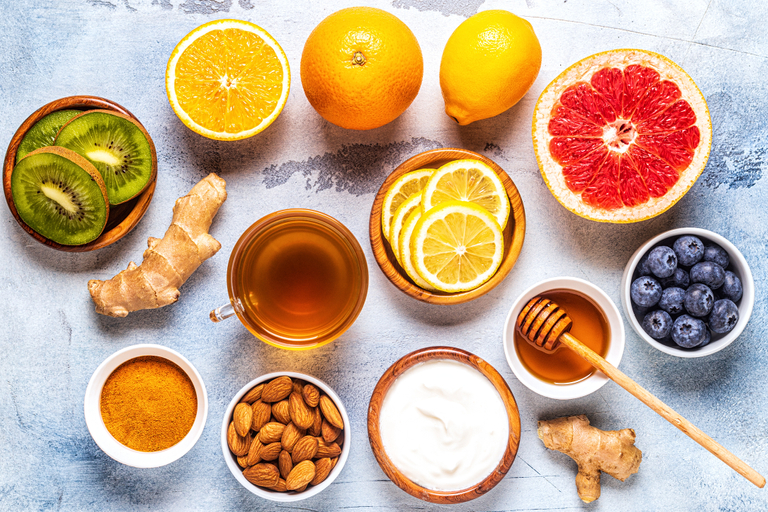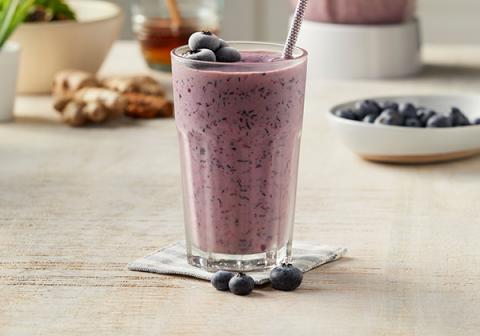
Top 10 immune system-boosting foods

Keeping a healthy immune system has always been important, but during the pandemic this has become a top priority in order to keep yourself and everyone around you safe and healthy. In this article we give you 10 foods that help boosting your immune system with natural sources.
Who needs immune boosting? – The signs of weakened immune system
Our immune system is responsible for defending our body from invaders and pathogens that can cause diseases. Such pathogens can be bacteria, viruses, parasites and foreign bodies that affect our regular body functions, which are then fought by our immune system.
Although a strong immune system does not necessarily mean we will never be getting sick, it does help us to reduce the severity of the symptoms and avoid complications. In general, once the body has produced and antibody to fight a specific pathogen, a copy of that antibody remains in the body so, if the virus or bacteria comes again, then it can be dealt with more quickly.
Symptoms of a weak immune system
-
Always have cold: A cold (or flu) is a normal sickness everyone has to deal with two or three times a year, so that in itself isn’t a reason to worry or assume the immune system is weak. But once it becomes too frequent or it lasts for a period longer than 10 days, it could be sign that your immune system needs a boost.
-
Frequent infections: Given the role it plays in battling infections, constantly having to battle through them is a clear sign something is not going well with our immune system. Some of the most common infections are pneumonia, meningitis, bronchitis, skin infections, ear infections or chronic sinusitis. Let’s not forget that complications on any of these infections could have terrible consequences for our health, therefore it is important to pay attention to the signs.
-
Feel tired all the time: When the immune system is struggling, so does your energy level. If you are getting enough sleep but still feel the need to take an occasional nap, or you feel tired throughout the day, you might want to check your immune system: It could be a sign that your body went into „energy saving mode” to focus that little energy into battling germs in order to support a weak immune system.
-
Wounds heal slowly: The immune system also plays a role healing wounds. In fact, the skin is the first layer of defence against external pathogens. When your skin is burned, scraped or cut, the body sends blood rich in nutrients and healthy immune cells in order to start healing the wound and support skin regeneration; a process that can’t happen when your body’s immune system is low.
-
Digestive issues: Studies show the majority of the immune system is located in the digestive track for it to be able to fight the different pathogens that might enter the body through the food we consume. In addition, the good bacteria and microorganisms that live there protect the gut from viruses, chronic inflammation and other autoimmune disorders. Frequent diarrhea, gas or constipation could be a consequence of a weak immune system.
What weakens the immune system?
1.Lack of sleep: Ever wondered why resting is recommended by the doctor for pretty much everything? While sleeping, the body releases proteins called cytokines, which support the immune system and help you battle infections and diseases. In addition, not sleeping makes you prone to catching more viruses and germs; therefore, not only the body is at more risk of being attacked, but will also lack the immune support to defend itself.
2.Lack of exercise: Exercise is one of the best ways to boost up the immune system naturally. The reason is that exercising increases the heart rate, helping blood go around the body more efficiently, further helping immune cells to reach areas at risk.
3.Stress: People suffering from constant stress and anxiety are prone to getting sick constantly, as these factors can weaken the immune system very fast, making it harder to battle viruses and infections.
4.Low vitamin D: One of the most important roles vitamin D plays in your body is maintaining a strong immune system. Common diseases like the flu can be signs of low levels of vitamin D, and different studies have shown how its deficiency is linked to respiratory problems such as regular colds, bronchitis and pneumonia.
5.Few veggies and fruits: Next to regular physical exercise, a healthy nutrition is an excellent way to strengthen the immune system. Fruits and vegetables help the body produce white cells (immune cells); while also helping reduce body fat percentage, which can further support your immune response.
6.Smoking: Chemicals present in tobacco, cigarettes and even e-cigarettes supress the body’s immune function.
7.Alcohol: One night of drinking high amounts of alcohol slows down the body’s ability to fight germs and viruses for even 24 hours, which is why people who drink often (more than one or two drinks per day) tend to get sick often.
Best immune-system boosting foods
1. Yogurt: Natural Greek yogurt is a great addition to any diet because of its high protein content compared to regular yogurt. But it is especially important when it comes to helping the immune system and improving gut health, thanks to its content of probiotics (responsible for supporting the good disease-fighting bacteria). Yogurt can also be a great source of vitamin D, further boosting the immune system naturally.
2. Citrus fruits: Fruits like grapefruits, oranges, clementines, tangerines, lemons and limes are a must have if the goal is to improve immune response. They contain high amounts of vitamin C, which increases production of white cells (immune cells). It is important to remember that the body does not product vitamin C, so it must consumed daily in the form of foods or nutritional supplements.
3. Blueberries: They are an excellent source of antioxidants (molecules that help the body fight free radicals). Free radicals are unstable atoms that cause damage to the cells and result in, either diseases and illnesses, or simple deterioration, accelerating aging with it. The antioxidants found in blueberries are especially helpful to prevent the common cold, improve skin appearance and reduce signs of aging.
4. Clean soups: Low-fat warm soups such as chicken soup are a traditional home remedy when someone’s going through a cold, not just because of their cosy warm feeling that comes well for a day in bed, but also because of their anti-inflammatory effect. They help fight the inflammation in the respiratory tract associated with the cold or other viruses and infections.
5. Broccoli: Broccoli is one of the super vegetables that are loaded with vitamins and minerals that are important for overall health. It contains vitamins A, C and E, in addition to dietary fibres and many antioxidants. It is important to cook it as little as possible for it to preserve is health benefits, which makes steaming the best way to cook it before putting it in your plate. Chemicals in this vegetable help turn on antioxidant genes and enzymes in specific immune cells too.
6. Cabbage: Just like citrus fruits, cabbage is a great source of vitamin C and the associated immune health benefits associated with it. Cabbage also joins the group of powerful cruciferous vegetables like broccoli, kale and collard greens, with powerful antioxidants to fight infections. It can be helpful to prevent the common cold and also to prepare the body for more serious or dangerous diseases.
7. Red pepper: This type of peppers is another alternative for vitamin C sources; in fact, one ounce of red bell peppers contains up to three times the amount of vitamin C present in one ounce of oranges. Peppers also contain beta-carotene, which, once the body processes it and transforms it into vitamin A, will help to promote the health of eyes and skin.
8. Spinach: Speaking of beta-carotene, spinach is a great source of this pigment and it is also rich in vitamin C. This antioxidants bomb is one of our best allies to fight infections and boost our immune system, and it is also packed with fibre that helps regulate our digestive system. Spinach not only helps prevent the common cold but also helps to reduce symptoms when we are sick.
9. Garlic: Garlic has been one of the go-to alternatives to cure people with a common cold for decades, as a result of its heavy concentration of sulphur-containing compounds and other immune boosting properties. Garlic is also believed to slow down the hardening of arteries, which helps the easy transportation of immune cells and the distribution of nutrients in the body.
10. Ginger: Although we can’t go as far as suggesting ginger tea will keep us away from being sick, making a habit of drinking ginger tea is a great way to give the immune system the daily boost it needs. Ginger helps reduce inflammation and comes in very handy to reduce symptoms of the common cold like a sore throat.
11. Seeds: Phosphorus, magnesium and vitamins B6 and E are some of the benefits of different seeds such as sunflower seeds. From these, vitamin E is especially important for a stronger immune system and, on top of that, the selenium present in an ounce this type of seeds is almost half of the daily amount needed by a regular adult to reap its benefits.
12. Honey: The last addition to that morning immune boosting tea. Ginger, lemon and… honey! Besides relieving sore throat and soothing the symptoms of a cold, honey also works as an antibacterial and kills the germs in the body that could be making you sick in the first place. Honey is a preventive and remedy food that you can safely add to any immune boosting shopping list.
German Henao

